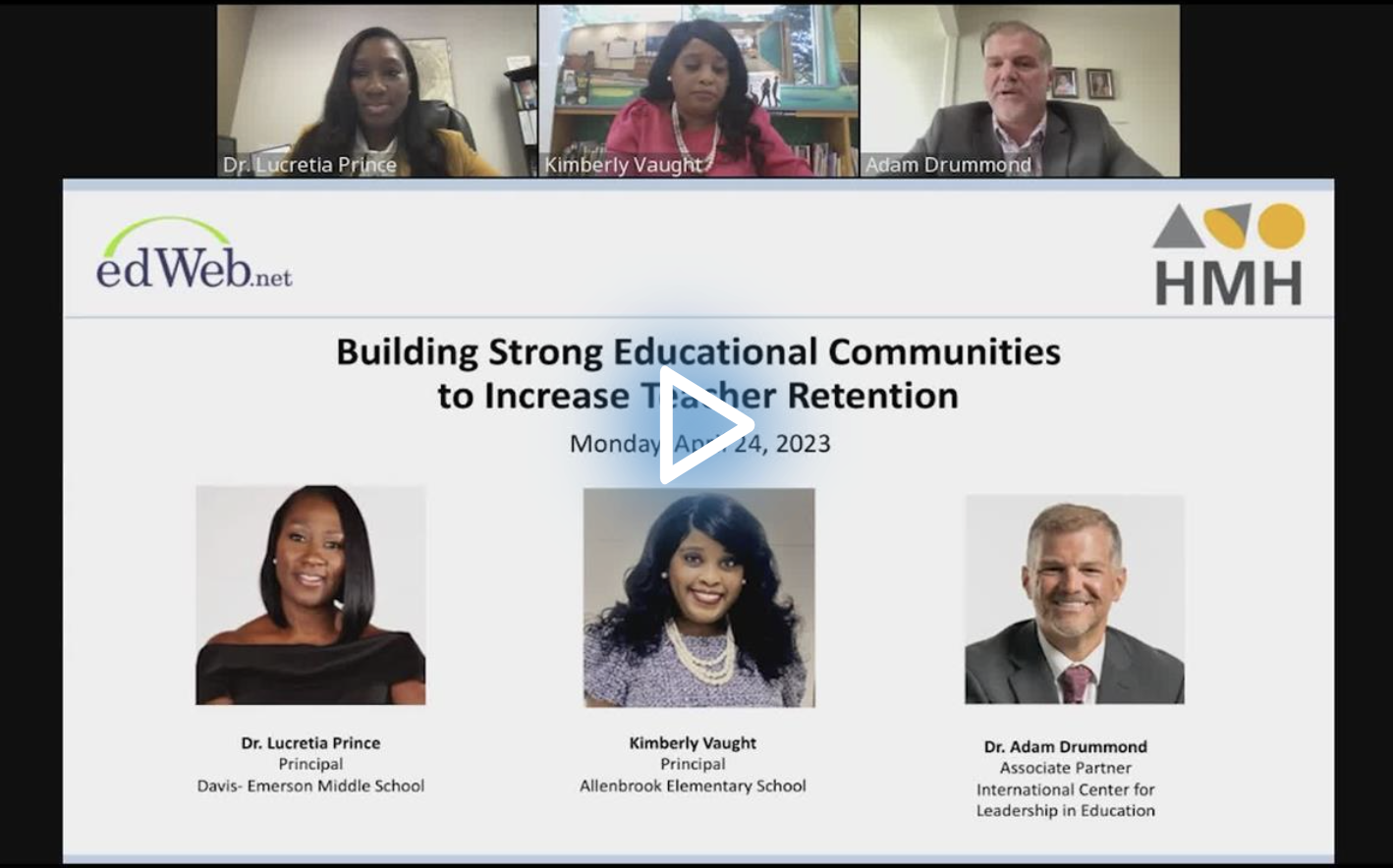Want to Increase Teacher Retention? Build Relationships
Watch the Recording Listen to the Podcast
With the national teacher shortage crisis looming over districts, retaining teachers has become a pressing issue. In the edLeader Panel, “Build Strong Educational Communities to Increase Teacher Retention,” Dr. Adam Drummond of ICLE and two school principals, Kimberly Vaught and Dr. Lucretia Prince, discussed their strategies for retaining top talent and building successful schools.
Creating strong, trusting relationships between stakeholders, providing coaching and mentorship networks, modeling excellence, and setting a clear vision were some of the key takeaways for school administrators to increase teacher retention and create a winning culture.
The conversation kicked off by naming the most common reasons teachers leave the classroom: lack of preparation, lack of support for new teachers, and challenging working conditions. Vaught, Principal of Allenbrook Elementary School (NC), and Dr. Prince, Principal of Davis-Emerson Middle School (AL), explained that in order to create a retention strategy that addresses these problems, schools must begin by building strong, trusting relationships between stakeholders.
To do that, principals need to be present, observe, and understand teachers’ learning trajectories to personalize them for their needs—developing relationships and trust with their staff along the way. Additionally, it’s important to build coaching and mentorship networks to make sure that teachers have champions of their work.
As Vaught said, “…we are responsible for modeling the expectations of what we want to see when we walk in the classroom, what we want to see when we are in the halls, what we want to see when the students come in the cafe—modeling is necessary in this new era of education.”
As a leader, it’s hard to overemphasize the importance of developing your team’s winning mindset. Principals can build this culture by ensuring that resources are proactively available, teachers are placed where they can have optimal outcomes, asking for help is encouraged, and there are peer-to-peer learning networks so educators can take advantage of each other’s experience.
Administrators should also be conscious about setting up “quick wins” to motivate new teachers from day one, ensuring that they feel empowered to take risks, be vulnerable, and learn as they go.
When setting up peer-to-peer coaching programs, both Vaught and Dr. Prince emphasized the importance of learning together as a team. They named three crucial elements to any program: modeling excellence, giving authentic feedback, and practicing strengths-based coaching.
First, it begins with dismantling the idea that if you’re being coached, you’re doing something wrong. Instead, they encourage a mindset that says, “We’re all in this together,” and then as a school leader, make sure that you’re modeling that mindset by being present alongside teachers and enabling resources for their success.
Additionally, administrators should publicly celebrate wins, recognize effort and resilience, and encourage teachers to prioritize relationships with their students and with one another.
Another important point that Dr. Prince added is that all schools need a clear vision. The principal is responsible for setting that vision and then empowering his or her team to get there. An excellent leader sets realistic expectations for staff, shows vulnerability on the pathway to reaching goals, and is a powerful advocate for teachers and students.
Both principals shared multiple stories of how the act of setting up communication channels for staff was an important first step—but the real difference came when they showed that they were listening to their teachers. Setting aside ego, leaning into a team mentality, and continuously showing up for staff were the keys to building trusting relationships that guided teams to be highly effective.
At the end of the panel, it became clear that two highly effective principals leaned into the same strategy: building relationships with teachers. The conversation emphasized the need for principals to be present and supportive of their staff, to provide coaching and mentorship opportunities, and to celebrate teachers’ successes and resilience.
Additionally, the principals stressed the importance of having a clear vision and values, setting realistic expectations, and leading with heart and humanity. The edLeader Panel provided valuable insights and practical strategies for improving teacher retention and creating a supportive, collaborative environment that enables teachers to thrive and students to succeed.
Learn more about this edWeb broadcast, “Build Strong Educational Communities to Increase Teacher Retention,” sponsored by HMH Professional Services.
Watch the Recording Listen to the Podcast
Join the Community
Leadership 3.0: Essential Skills for Innovative Leaders is a free professional learning community where school and district leaders collaborate on innovative strategies to help teachers grow professionally, advance student learning, and improve communications with all stakeholders.
Partnering with teachers and leaders to inspire innovation and improve outcomes through accessible, actionable, and relevant professional learning.
Blog post by Laura Smulian, based on this edLeader Panel.






Comments are closed.